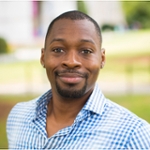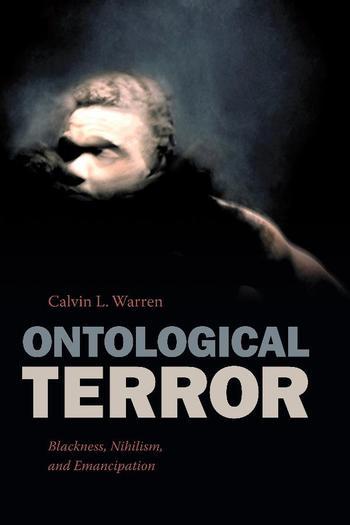
Open Access Week 2019 takes place from October 21-27. To mark the occasion, we’re featuring a series of Open Access Success Stories that shine the spotlight on noteworthy OA books, authors, and publishing models. Today’s post features Calvin L. Warren, Assistant Professor in the Department of Women’s Gender, and Sexuality Studies at Emory University. His book Ontological Terror: Blackness, Nihilism, and Emancipation (Duke University Press, 2018) examines how all humanism is based on investing blackness with nonbeing—a logic which reproduces antiblack violence and precludes any realization of equality, justice, and recognition for blacks. Ontological Terror is available under a CC BY-NC-ND license, supported by Emory University as part of the TOME initiative. We recently sat down with Professor Warren to discuss his decision to make Ontological Terror openly available.
Authors Alliance: Given that many (if not most) humanities monographs are still published via traditional channels, why did you choose open access publishing for Ontological Terror?
Calvin Warren: Unfortunately, academic knowledge is becoming increasingly inaccessible, and this “epistemological exclusivity” is resulting in disturbing patterns of asymmetry. Journals require membership to read current scholarship, and this financial barrier prevents students and scholars from resource poor institutions from acquiring information. The cost of academic books is equally exorbitant, reinforcing the dynamic that knowledge acquisition requires money. I’ve grown uncomfortable with this dynamic and had been searching for a mechanism to make my work more accessible to high school students, lay readers, community colleges, and institutions with limited resources. Open access provided such a mechanism and addressed the inequity of knowledge acquisition. Accessing my book for free has increased my readership and made it possible for black nihilism, as an idea, to expand its horizon.
AuAll: Did the subject matter of your research and/or your audience influence your decision to publish openly? If so, how?

CW: I’ve developed a philosophical perspective “black nihilism” that presents contemporary problems of black existence, anti black violence, and black suffering as deep philosophical issues. Because my work is in constant dialogue with the unceasing, ubiquitous, and regenerating problem of anti blackness, I wanted my work to reach as many people as possible—especially young people who live under the press of anti black terror. My subject matter required a platform widely accessible because people within and outside the academy were searching for answers to difficult questions.
AuAll: Before this book project, what was your impression of open access publishing?
CW: Open access was unfamiliar to me when I began my academic career, and I wish I’d known about it in graduate school. I do hope the [TOME] program recruits early career scholars, who are often producing the most provocative and groundbreaking work. I’m very grateful that Emory University invested time and resources for me to publish with open access.
AuAll: What results have you seen from publishing your book openly?
CW: Open access has widened my readership, exposing my work to artists, scientists, ministers, politicians, people I hadn’t expected to read my work. When access is open, more democratic, ideas can travel without restriction. And this has been my experience.
AuAll: What advice do you have for scholarly authors who want to make their ideas widely available?
CW: My advice to any authors with important ideas, especially those that speak to contemporary concerns, is to consider open access. Make an appointment with open access staff and discuss the possibility of this platform. It will create unexpected opportunities. Also, publishers often consider the open access funds “book sales” so it reduces some pressure from young scholars who need book sales for career stability. In short, open access is a gift to the academy and will lead the way in democratizing knowledge accessibility.
Discover more from Authors Alliance
Subscribe to get the latest posts sent to your email.
